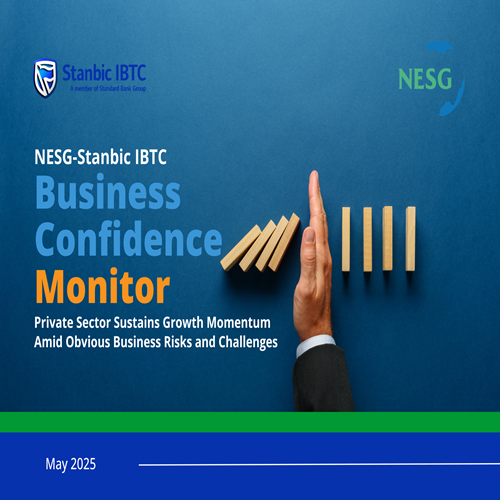Posted Thu, May 8, 2025 8:21 PM
Download Report (679 downloads)
The Business Confidence Monitor (BCM) is the flagship survey-based report of the Nigerian Economic Summit Group (NESG), supported by Stanbic IBTC. The report obtains qualitative information on the current business performance within the Nigerian economy and gauges expectations about overall economic activities in the short term. It is anchored on business managers’ optimism on key leading economic indicators such as investment, prices, demand conditions, employment, etc.
Nigeria’s business environment recorded a positive performance in April 2025, sustaining the favourable momentum observed since the beginning of the year. The NESG-Stanbic IBTC Business Confidence Monitor (BCM) showed an increase in the Current Business Index to +12.29 in April 2025 from +6.58 in March 2025. This performance is driven by improvement in business conditions and the uptick in business activities.
A sub-sectoral analysis indicated weakly positive outcomes across all economic sectors included in the index. Notable strong performances were recorded in Trade (+25.12) and Non-manufacturing (+23.59), followed by Manufacturing (+8.78), Agriculture (+7.02), and Services (+6.54). While all sectors improved relative to their March 2025 performance, the Trade sector recorded the most significant leap, from +0.51 in March to +25.12 in April. The rise coincided with two major festivals that typically drive higher spending on food, clothing, and household goods.
Despite the generally positive trend, structural challenges continued to dampen overall business growth. The general business situation remained positive, with improvements in production levels, operating profits, cash flow, and employment. However, the cost of doing business slightly worsened, rising to +51.79 in April from +48.44 in March 2025.
The most significant negative indicators were reduced investment (-15.00) and declining price levels (-16.62). These factors, combined with other weak business conditions, collectively slowed business activity and growth in April 2025.
Persistent power shortages, high commercial lease/rental property costs, limited access to financing, inadequate foreign exchange availability, and unclear economic policies emerged as key constraints to business expansion. High commercial
lease/rental property costs remained a notable challenge for the second consecutive month, highlighting their disruptive effect on business operations. Similarly, restricted access to financing continued as a structural barrier, further limiting business growth throughout the month.
